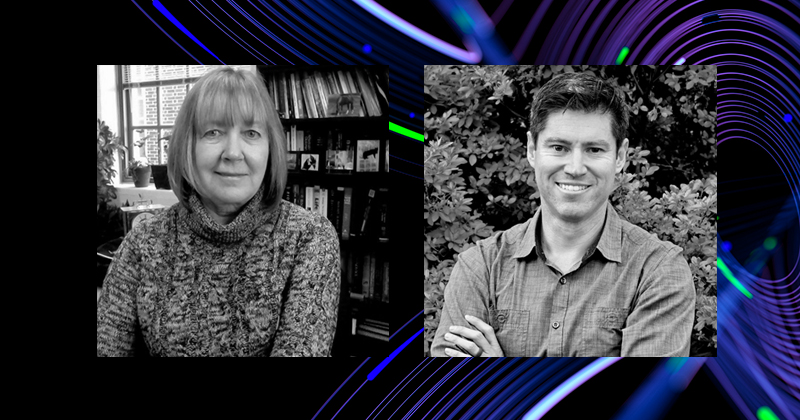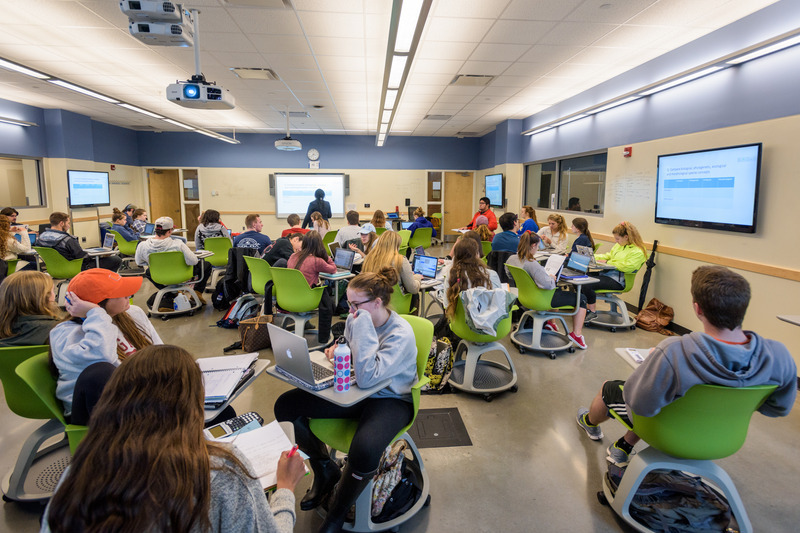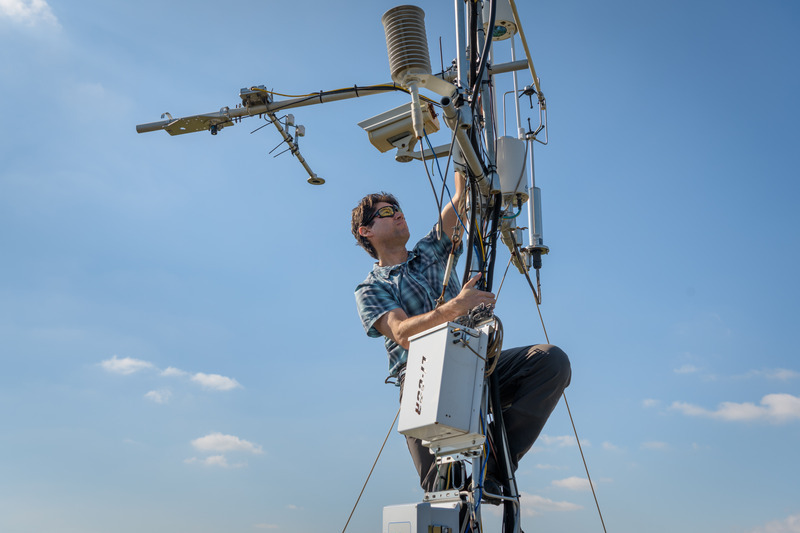


Blazing a trail for science
Photo illustration by Jeffrey C. Chase | Photos by Evan Krape April 26, 2024
Two University of Delaware faculty members elected AAAS Fellows
Two University of Delaware professors have been elected fellows of the American Association for the Advancement of Science (AAAS) — one of the largest scientific societies in the world and publisher of the Science family of journals.
The 2023 class of AAAS Fellows includes 502 scientists, engineers and innovators across 24 disciplines, who are being honored for their scientifically and socially distinguished achievements.
Rodrigo Vargas, professor of ecosystem ecology and environmental change in UD’s College of Agriculture and Natural Resources, is recognized "for distinguished contributions to carbon dynamics across the terrestrial-aquatic interface, development of environmental networks, novel data analysis tools and his leadership in creating a more diverse scientific workforce."
Deborah Allen, who retired from UD in 2019 as a professor of biological sciences, is cited “for transformational contributions to STEM education nationally and internationally, particularly for developments in problem-based learning and faculty development.”
“Being elected an AAAS Fellow is a stellar achievement, underscoring the recipient’s considerable impact on the scientific community,” said Kelvin Lee, UD’s interim vice president for research, scholarship and innovation. “We extend our heartiest congratulations to Rodrigo Vargas and Deborah Allen for receiving this distinguished lifetime honor.”
Deborah Allen, science education pioneer
“I'm, of course, very honored to be elected an AAAS fellow, but also very pleased that UD PBL is still receiving awards and recognition,” Allen said.
UD has been a pioneer in problem-based learning (PBL) since the early 1990s. This teaching approach challenges students to solve complex, real-world problems: Should we seed the ocean with iron as a “cure” for a warming planet, or how does a community validate a concern that it has a cancer cluster — does it really exist? These are among numerous problems included in the PBL Clearinghouse at UD.
In PBL, students work together in small groups and are motivated to learn in order to solve the problem — classroom spaces in UD’s Harker Interdisciplinary Science and Engineering Laboratory are purposely equipped with chairs on wheels and shared tables to facilitate brainstorming and discussions. Research has shown that this collaborative approach produces numerous benefits, from fostering long-term retention of knowledge to developing critical thinking and communications skills.

Allen has been at the forefront of PBL implementation at UD, working with colleagues to promote its adoption and development across campus and far beyond, including to teachers in Botswana, Brazil, Canada, Chile, Egypt, France, Guyana, Iceland, Japan, Mexico, Nigeria, Peru, Saudi Arabia and Taiwan.
While the earliest PBL course she taught at the University was physiology for Medical Scholars, a required course for students preparing for medical or dental school, she said the most special PBL course she instructed was Introduction to Biology.
“It was unique in that it was part of a National Science Foundation project to introduce PBL to the introductory sciences, something that was not being done in the United States at the time, in the early 1990s,” Allen said.
During her UD career, Allen served as director of the Center for Teaching and Assessment of Learning and of the Institute for Transforming University Education and its chapter of the national Center for Integration of Teaching, Research, and Learning. Previously, she was a science education program officer at the National Science Foundation.
Allen earned her doctorate in biological sciences from the University of Delaware and is co-author/editor of several books that describe PBL and other active, inquiry-based and team-based instructional strategies. She is a founding member of the editorial board of the journal CBE-Life Sciences Education and a recipient of UD's Excellence in Teaching Award and of the American Society for Cell Biology’s 2013 Bruce Alberts Award for Excellence in Science Education. She also has served as a Fulbright senior specialist in Peru to assist in development of a PBL program for middle school environmental science.
Recently, Allen received another major honor — she was elected to the AAAS Council, the association’s governing body, representing the Education section.
Rodrigo Vargas, environmental research leader
Vargas studies “carbon dynamics,” which he defines as the way carbon, a fundamental building block of life, moves across Earth’s ecosystems.
“I study how the planet ‘breathes’ as ecosystems absorb and release carbon, impacting everything from ecosystem function to the global climate,” Vargas said. “My research has allowed me to explore deserts, wetlands and forests around the world, each offering unique insights into how nature maintains its delicate balance.”
An ecosystem ecologist who studies how nature-based solutions can help address global environmental change in both terrestrial and coastal ecosystems, Vargas uses a variety of research methods, including data mining, machine learning, remote sensing, measurements of greenhouse gas fluxes and modeling techniques for forecasting applications.

Vargas said he is driven to pursue research in this area because he has already witnessed the impacts of human activities on natural ecosystems.
“I envision a sustainable future for the planet,” he said. “Thus, I work to understand how ecosystems respond to management and climate change.”
And many students are joining him in this work, especially from Latin America. He has received multiple recognitions for supporting minority students in STEM.
“I am the first Hispanic to be hired and become a full professor in the history of the College of Agriculture and Natural Resources,” Vargas said. “By sharing my own story with students, I strive to inspire and empower the next generation. My approach is grounded in empathy, sympathy and compassion to help students reach their goals.”
A Highly Cited Researcher, Vargas has been an author on over 180 peer-reviewed publications and has contributed to impactful assessments such as the Mexican Report on Climate Change, the United Nations Status of the World’s Soil Resources, the Second State of the Carbon Cycle Report (SOCCR2) and the 2023 USDA National Climate Change Roadmap.
He has received the Piers Sellers Mid-Career Award from the American Geophysical Union and the Mid-Career Faculty Excellence in Scholarship Award from UD.
Vargas received his Ph.D. in environmental sciences from the University of California-Riverside. He is a fellow of the Earth Leadership Program, a former member of the U.S. National Committee for Soil Science of the National Academies of Sciences, Engineering, and Medicine, and a member of the Earth and Environmental Science Subcommittee of the Franklin Institute.
Contact Us
Have a UDaily story idea?
Contact us at ocm@udel.edu
Members of the press
Contact us at 302-831-NEWS or visit the Media Relations website

